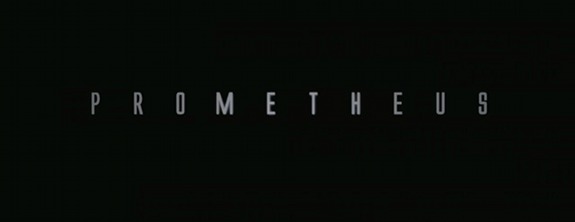
Ridley Scott’s Prometheus is a technical achievement – a visually stunning sci-fi realization made all the more dazzling with supreme use of 3D by a master playing with the form his first time. It’s an almost perfect marriage of practical and computer wizardry with rich CG landscapes and gruesome, tentacled monstrosities. But Prometheus is also a film of ideas and it’s the weight of too many ideas combined with a profound lack of character depth that make the film a stunning but lifeless affair.
I’ve made no secret my excitement for Ridley Scott’s return to the world of Alien, his second and arguably greatest work. With so much of Prometheus, a prequel, reverse engineered from Alien, Scott is perhaps opening himself up to some unfair expectations. For those expecting a straight follow-up and rightful successor to the original horror classic, you can abandon that notion immediately. Prometheus is not Alien.
Nor should it be. As Josh Miller points out in his Franchise Me, Alien is near-perfect filmmaking: a consummate blend of nightmarish horror and mind-bending science-fiction. It’s fertile ground, particularly with the mystery surrounding Alien’s Space Jockey, for a jumping-off point into both expanding the universe and exploring the questions the original film chose to leave unanswered.
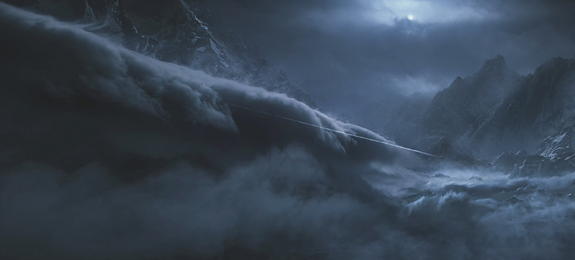
Beautiful landscapes like this one make Prometheus a visual treat for the eyes.
And yet it’s clear some mysteries are best left unsolved. The film explores in-depth the nature of those extraterrestrial astronauts discovered at the beginning of Alien – who they are, what they look like under those H.R. Giger designed space suits and, most importantly, their intentions with Earth past and present.
It’s not the answers that disappoint, but how the film provides those answers that rings uninspired. Damon Lindelof’s script (working off an earlier draft by Jon Spaihts) is engaging in broad stokes, but takes far too many shortcuts and shoddy character beats– infusing the film with a B-level of cheese that Scott, along with screenwriter Dan O’Bannon (also David Glier and Walter Hill, uncredited), were able to avoid with Alien. The real kicker is how we learn about the Space Jockeys – through holographic recreations showing their final moments. How they’re queued or why they even exist are never explained. It’s equivalent to watching 3D security footage. It’s a lazy way to tell a story, and the filmmakers go to that well far too often.
It’s the above-mentioned broad strokes that entice you to stay with Prometheus’ 124 minutes in the hope that it’ll improve. The film opens at the very beginning, quite literally, as we see how life on Earth was created. Seeking the how and why of our existence, scientist couple Elizabeth Shaw (Noomi Rapace) and Charlie Holloway (Logan Marshall-Greene) embark with a crew of 15 others aboard spaceship Prometheus to LV-223 – a distant moon that might provide the answers they seek (Alien, for those wondering, visits LV-426). They’re there at the funding of trillionaire businessman Peter Weyland (Guy Pierce sporting some truly horrendous old-man prosthetics). Alien fans will identify Weyland as one half of the future Weyland-Yutani Corporation, still just Weyland Corp. here. Also present is the ship’s grizzled, battle-tested mission director: Meredith Vickers (Charlize Theron). As you might expect, the mission becomes unhinged as the true nature of LV-233 is realized to eviscerating results.
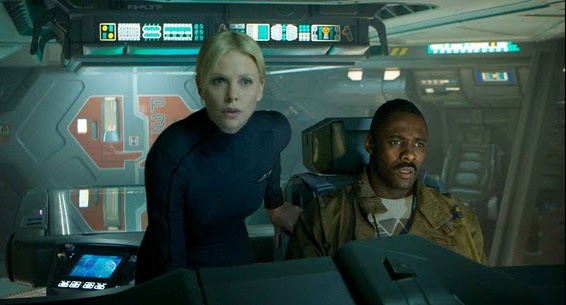
Top-notch production design keeps Prometheus visually in-step with its predecessor.
So much of what’s wrong with Prometheus is apparent with that needlessly robust crew. At 17, there are too many characters aboard this ship we’re expected to invest in. Scott and Lindelof attempt to inject these people with tics and motivations that feel arbitrary and tacked on. By end, most of them will still be nameless faces, some of whom will simply disappear. Ultimately, the crew of Prometheus is the audiences’ window into the Earth of 2192. As there’s not much to invest in character-wise, it’s difficult to invest in the threats posed to them and, potentially, Earth itself.
Noomi Rapace’s Shaw never connects like she should. It’s through no fault of Rapace’s – a welcome presence. Instead, there’s never enough of Shaw or her story to hold onto and care about. Her counterpoint Holloway is another story, as Marshall-Greene’s lifeless, thudding performance delivers one clunking line after another. You’re in a Ridley Scott movie, son. Attempt to raise your game.
Equally unfortunate is Idris Elba’s Janek, captain of the Prometheus. He’s never really introduced, he just sort of fades in and encapsulates the greater character issues of the film. He feels like a character someone aping Alien would write – in that he’s injected with an “aw shucks” charm the audience can identify with. But it’s hollow, as Elba is also forced to deliver the film’s most egregious spot of exposition, spelling out the nature of LV-233 in the most inorganic of moments and settings. It’s in that instance where Prometheus’ narrative truly squanders what little goodwill it’s built up. He makes a choice at the end of the film that would have great resonance had he and his associates been put to better use.
If Charlize Theron’s character’s motivations are unfocused, her performance is not. This turn, with Theron’s ability to project vulnerability and concern beneath that badass exterior, had me wishing that Vickers, not Shaw, was the true focal point of the film. Unfortunately Vickers eventually gets boxed into being one of the many heavies that drags Prometheus into an unfocused menagerie.
Michael Fassbender, as he’s wont to do, is again the best thing about the film he appears in. His android David is a diabolically ambivalent character – a savory addition to a franchise that’s already given film some of its most thought-provoking robots. I call some of David’s actions into question (particularly how he endangers the entire crew with an experiment he couldn’t possibly predict the result of) but that, again, is a criticism of the script and not the performance.
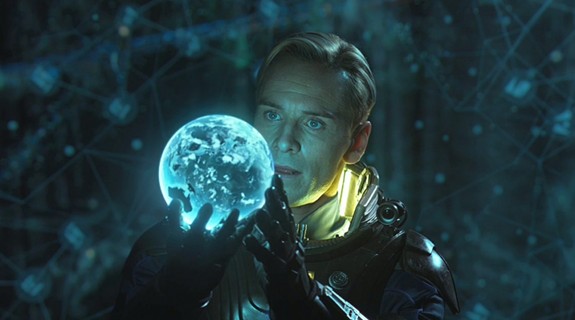
Michael Fassbender delivers another remarkable performance as David.
Prometheus is at its most engaging in moments of shock and horror. There’s a tentacle beast that gleefully owes its design to Alien’s facehugger. There’s also some live, bloody surgery taking place that amounts to the film’s strongest and most affecting scene. The practical work in Prometheus is every bit as gorgeous as Scott’s illustrious CG tapestries – proof positive that the work of great practical effects artists is still a necessary and worthwhile endeavor in modern film.
It all comes down to focus, of which Prometheus offers too little. Too many characters, too many threats, and too many ideas – all of which are never provided proper attention. The overreaching arc of the film is bogged down by B, C, D, E and F plotlines that go in divergent directions. The ship of the Space Jockey is a house of horrors, but its horrors never manifest a cohesive story. We’re pulled in a variety of directions that, when presented with the biggest threat, are abandoned. Where Alien raised extraordinary questions, Prometheus goes about answering them in truly ordinary ways – or not at all. The nature of the Space Jockey, or at least their purpose on LV-233, will be underwhelmingly apparent long before Janek appears to spell it out.
Prometheus is not a lead-up to Alien. It ends on a jumping-off point to explore one of its own entangled mysteries – one that I have no interest exploring with it. For those wondering: yes, you will know quite explicitly that this takes place in the Alien universe. However, it occurs in a reveal that serves no greater purpose or threat, as the story has already moved away. It amounts to a shallow, though admittedly very cool-looking, bit of fanwank.
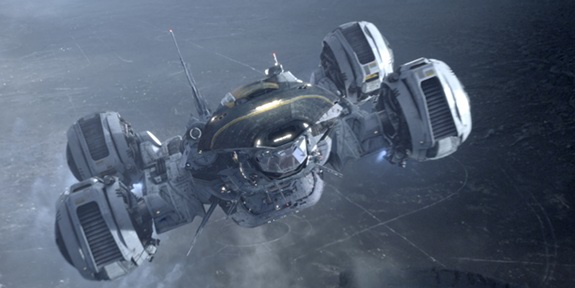
The titular ship taking off.
And with that, I’m left contemplating whether genre filmmaking is indeed a young filmmaker’s game. In recent years we’ve seen the likes of John Carpenter, George Lucas, Steven Spielberg and now Ridley Scott revisit genres or universes they helped bring to prominence – all to middling results. Prometheus never sinks to levels of Star Wars prequel or Crystal Skull awfulness, but it offers a strikingly-similar soulless experience – one that revels in technical mastery while neglecting the captivating storytelling that put its predecessor on the map.
I wish I could give Prometheus higher marks. From a visual standpoint, this is a film that does everything right. Visually astounding yet hollow in every other conceivable aspect, it’s one half of a great film. As such, I can only give it one half of a ringing endorsement.



Out of a Possible 5 Stars